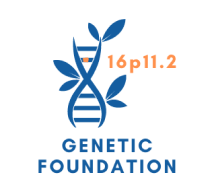16p11.2 deletion syndrome is a genetic disorder that can have significant effects on the lives of individuals and families. With its wide-ranging impact on development, cognition, behavior, and overall well-being, intervention becomes crucial for maximizing potential and improving outcomes. In this page, we explore the reasons why early and comprehensive intervention is essential for individuals with 16p11.2 deletion syndrome.
- Maximizing Developmental Potential: Intervention at an early age can help optimize developmental trajectories for individuals with 16p11.2 deletion syndrome. By providing tailored support and therapies, such as speech and occupational therapy, physical interventions, and educational interventions, we can target specific areas of development and address delays or difficulties. Early intervention has been shown to improve cognitive, language, and motor skills, enhancing the individual’s overall developmental potential.
- Enhancing Communication and Social Skills: Many individuals with 16p11.2 deletion syndrome experience challenges in communication and social interaction. Intervention programs can focus on improving communication skills, including speech and language development, nonverbal communication, and social interaction abilities. Through structured interventions, individuals can learn effective communication strategies, social cues, and adaptive behaviors that facilitate social connections and meaningful relationships.
- Promoting Cognitive and Academic Abilities: Intervention plays a crucial role in supporting cognitive and academic development for individuals with 16p11.2 deletion syndrome. With tailored educational programs and specialized teaching techniques, individuals can receive targeted instruction that addresses their specific learning styles, strengths, and challenges. Individualized educational plans, accommodations, and assistive technologies can help individuals with 16p11.2 deletion syndrome succeed academically and reach their full intellectual potential.
- Addressing Behavioral Challenges: Behavioral challenges, such as impulsivity, hyperactivity, anxiety, and difficulty with emotional regulation, are common in individuals with 16p11.2 deletion syndrome. Intervention programs can provide behavioral therapies, counseling, and psychological support to address these challenges. By teaching coping strategies, emotional regulation techniques, and social-emotional skills, individuals can better manage their behaviors, reduce anxiety, and improve their overall well-being.
- Supporting Daily Living Skills: Intervention also focuses on developing and enhancing daily living skills to foster independence and autonomy. Occupational therapy and life skills training can help individuals with 16p11.2 deletion syndrome acquire essential self-care skills, such as dressing, grooming, feeding, and managing personal hygiene. These interventions aim to promote independence and improve overall quality of life.
- Providing Support for Families: Intervention programs not only benefit individuals with 16p11.2 deletion syndrome but also provide crucial support for their families. By offering counseling, parent education, and support groups, families can access resources, learn effective strategies for caregiving, connect with other families facing similar challenges, and navigate the complexities of raising a child with 16p11.2 deletion syndrome. These support systems are essential in promoting resilience, well-being, and informed decision-making for families.
Intervention is a vital component in the comprehensive care of individuals with 16p11.2 deletion syndrome. By targeting developmental, communication, cognitive, behavioral, and daily living challenges, intervention programs empower individuals, enhance their quality of life, and promote their overall well-being. Furthermore, early intervention sets the foundation for long-term success by maximizing developmental potential and enabling individuals to reach their full potential. It is through these interventions that we can create a more inclusive society that embraces the diverse strengths and abilities of individuals with 16p11.2 deletion syndrome.


